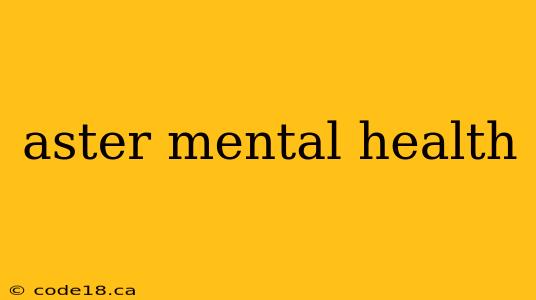Meta Description: Discover the complexities of Aster mental health, a term encompassing various mental health challenges faced by individuals within the Aster community. Learn about common issues, effective coping strategies, resources available, and the importance of seeking professional help. Explore how cultural factors, societal pressures, and personal experiences intersect to impact mental well-being within the Aster community. (Character count: 158)
What is Aster Mental Health?
The term "Aster mental health" isn't a formally recognized clinical diagnosis. Instead, it refers to the mental health and well-being of individuals who identify with or are part of the Aster community. This community could be defined by shared geographic location, cultural background, professional field, or any other commonality. Understanding "Aster mental health" requires examining the specific challenges and stressors faced by this particular group. This could involve exploring how societal pressures, cultural norms, and unique life experiences contribute to mental health concerns within the Aster community.
Common Mental Health Challenges Faced by the Aster Community
Identifying specific mental health concerns within the Aster community requires more information about what defines this group. However, some common mental health challenges that can affect any population include:
- Anxiety Disorders: Generalized anxiety, social anxiety, panic disorders.
- Mood Disorders: Depression, bipolar disorder.
- Trauma-Related Disorders: Post-traumatic stress disorder (PTSD), complex PTSD.
- Substance Use Disorders: Alcohol or drug abuse.
- Eating Disorders: Anorexia, bulimia, binge eating disorder.
How Cultural Factors Influence Aster Mental Health
Culture significantly impacts mental health. Specific cultural norms, values, and beliefs within the Aster community might influence how mental health issues are perceived, discussed, and addressed. Some cultures might stigmatize mental illness, leading to delayed help-seeking. Others might have unique coping mechanisms or traditional healing practices. Understanding these cultural nuances is crucial for effective intervention.
Societal Pressures and Their Impact
Societal pressures, such as those related to career success, financial stability, or family expectations, can contribute to stress and mental health problems. If the Aster community faces unique societal pressures, these might exacerbate mental health challenges. For instance, pressure to conform to specific group norms or achieve certain milestones could negatively affect mental well-being.
Seeking Help and Available Resources
It's essential to remember that seeking professional help for mental health concerns is a sign of strength, not weakness. If you or someone you know in the Aster community is struggling, several resources are available:
- Therapists and Counselors: Mental health professionals can provide therapy, counseling, and support.
- Support Groups: Connecting with others facing similar challenges can be incredibly beneficial.
- Online Resources: Many online resources offer information, support, and self-help tools. (Link to a reputable mental health organization, e.g., the National Alliance on Mental Illness (NAMI))
- Crisis Hotlines: In times of crisis, immediate help is available through crisis hotlines. (Link to a relevant crisis hotline)
Coping Strategies for Improving Aster Mental Health
Building resilience and maintaining mental well-being requires proactive strategies. Some effective coping mechanisms include:
- Mindfulness and Meditation: Practices that promote present moment awareness and reduce stress.
- Physical Exercise: Regular physical activity releases endorphins and improves mood.
- Healthy Diet and Sleep: Nourishing your body supports your mental health.
- Strong Social Connections: Maintaining supportive relationships provides emotional support.
- Engaging in Hobbies and Activities: Finding enjoyable activities promotes relaxation and reduces stress.
The Importance of Open Communication within the Aster Community
Open and honest communication is vital in addressing Aster mental health. Reducing stigma and creating a supportive environment where individuals feel comfortable seeking help is essential. Encouraging conversations about mental health within the Aster community can help normalize these experiences and promote help-seeking behaviors.
Conclusion: Building a Supportive Environment for Aster Mental Health
Addressing Aster mental health requires a multi-faceted approach. By understanding the unique challenges faced by the Aster community, acknowledging the impact of cultural factors and societal pressures, and promoting open communication and access to resources, we can create a more supportive and inclusive environment that prioritizes mental well-being. Remember, seeking professional help is a crucial step in addressing mental health concerns, and resources are available to support individuals and communities on this journey. Let's work together to foster a culture of understanding and care within the Aster community.
